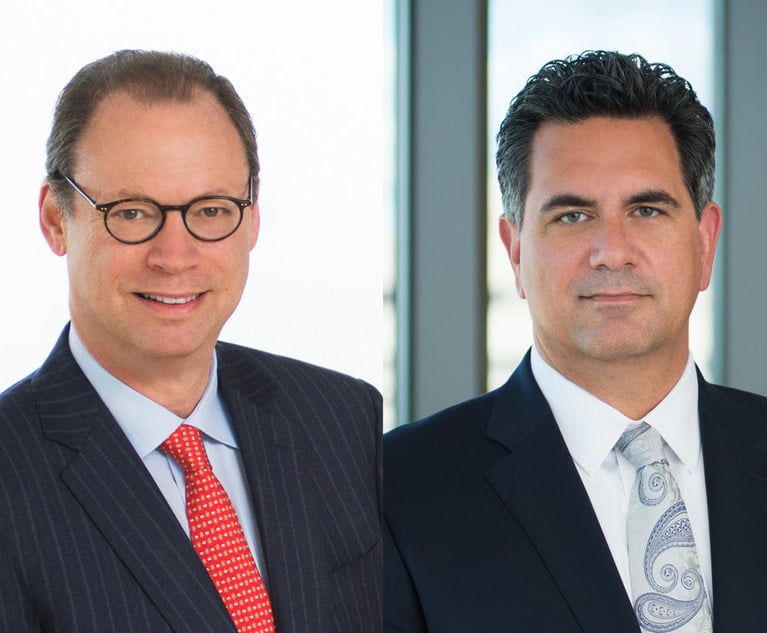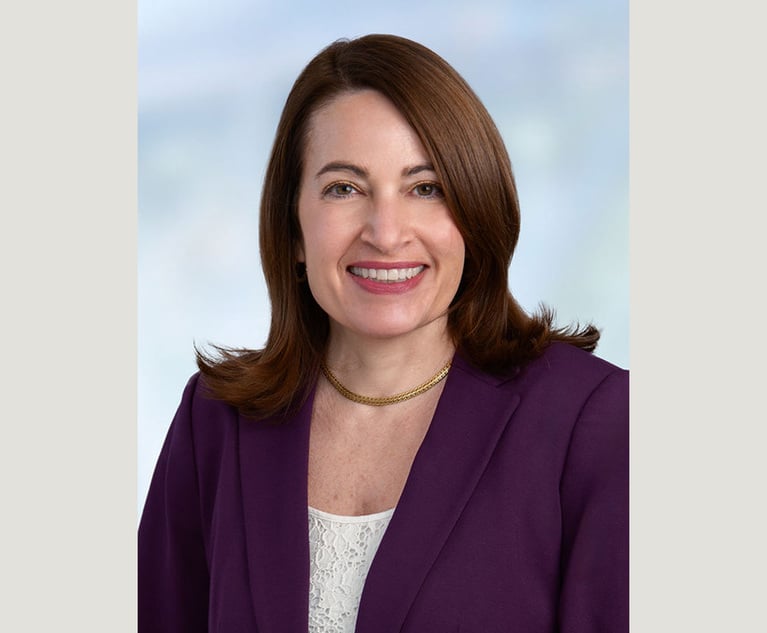 Left to right: Andrew Kassner and Joseph Argentina , Drinker Biddle & Reath
Left to right: Andrew Kassner and Joseph Argentina , Drinker Biddle & Reath Payment Under Critical Vendor Order Does Not Bar Preference Liability
U.S. Bankruptcy Court Judge John T. Dorsey for the District of Delaware ruled that a supplier's receipt of payment under a critical vendor order does not bar the debtor or trustee from pursuing a preference claim to recover amounts paid prepetition to the vendor.
October 14, 2021 at 12:32 PM
8 minute read
As a general rule, the Bankruptcy Code provides that prepetition trade creditors receive distribution on their claims, if any, in a Chapter 11 case only in connection with a Chapter 11 plan. However, over the years, courts recognized some suppliers were viewed as critical by the debtor and needed to be paid sooner in order for the debtor to continue to have access to the goods or services provided by those suppliers on credit. As such, a supplier of critical goods or services sometimes received all or partial payment of its prepetition claim in the early days of the case in exchange for its commitment to continue to provide those goods or services during the case on similar credit terms to the prepetition arrangement. However, over the years, at the end of the case, the debtor or liquidating trustee often sought to claw back payments the supplier received in the 90 days before the bankruptcy case as a preference. Of course, if the supplier had not received the prepetition payments, it likely would have insisted it be paid those amounts as a critical vendor after the filing. And perhaps those payments would have been paid along with the open accounts receivable amounts that were paid in exchange for continuing to do business with the debtor post-petition. This issue was recently addressed by Judge John T. Dorsey of the U.S. Bankruptcy Court for the District of Delaware in Insys Liquidation Trust v. McKesson (In re Insys Therapeutics), Adv. Case No. 21-50176. Dorsey ruled that a supplier's receipt of payment under a critical vendor order does not bar the debtor or trustee from pursuing a preference claim to recover amounts paid prepetition to the vendor.
- The Bankruptcy Court authorized payment to the defendants on unpaid prepetition debts as of the petition date, but they later were sued for prepetition amounts that had been paid before the petition date.
According to the opinion, Insys Therapeutics, Inc. and its affiliates (debtors), a specialty pharmaceutical company that developed and commercialized drugs and drug delivery systems, provided development, operational, implementation and maintenance services to the debtors. Shortly after filing their bankruptcy petitions on June 10, 2019, the debtors sought court approval to pay certain prepetition claims in order to maintain their critical customer programs. The motion identified certain the defendants as "critical customers" and requested that the Bankruptcy Court authorize payment of prepetition amounts owed to them to allow the defendants to continue to provide services required to maintain the customer programs. The court entered an order (customer order) that authorized maintenance of the customer programs and payment of the prepetition claims, but the order did not specifically direct payment of the claims.
On Feb. 23, over 20 months after the bankruptcy filing, William Henrich, the liquidating trustee of the Insys liquidation trust, filed a complaint against the defendants that asserted several causes of action, including a claim to avoid prepetition payments under Section 547 of the Bankruptcy Code the defendants had received as preferences. The defendants filed a motion to dismiss the complaint, asserting, among other things, the preference claims should be dismissed because had the amounts at issue not been paid, they would have been paid under the customer order.
- Payment of prepetition claims under the customer order did not insulate the defendants from preference liability for prepetition payments.
The court began its analysis by listing the elements of a preference under Section 547 of the Bankruptcy Code. One element requires the trustee to prove that by receiving the alleged preference payment, the creditor received more than it would have received in a Chapter 7 liquidation. The defendants argued the customer order authorized payment of all amounts owed to them, and as such, the defendants did not receive more than they would have in a liquidation had the payments not been made prepetition because the defendants would have been paid in full under the customer order. In response, the trustee cited authority for the proposition that critical vendor orders do not automatically preclude preference claims and, although the customer order authorized payment, it did not require it. The trustee also argued that the customer order expressly reserved the ability of the estate to assert preference claims against the vendors.
This content has been archived. It is available through our partners, LexisNexis® and Bloomberg Law.
To view this content, please continue to their sites.
Not a Lexis Subscriber?
Subscribe Now
Not a Bloomberg Law Subscriber?
Subscribe Now
NOT FOR REPRINT
© 2025 ALM Global, LLC, All Rights Reserved. Request academic re-use from www.copyright.com. All other uses, submit a request to [email protected]. For more information visit Asset & Logo Licensing.
You Might Like
View All

'In Re King': One Is Definitely the Loneliest Number When Filing an Involuntary Petition
7 minute read
Delaying Rent Payment by Assisted Living and Skilled Nursing Facilities in Chapter 11
7 minute readLaw Firms Mentioned
Trending Stories
- 1We the People?
- 2New York-Based Skadden Team Joins White & Case Group in Mexico City for Citigroup Demerger
- 3No Two Wildfires Alike: Lawyers Take Different Legal Strategies in California
- 4Poop-Themed Dog Toy OK as Parody, but Still Tarnished Jack Daniel’s Brand, Court Says
- 5Meet the New President of NY's Association of Trial Court Jurists
Who Got The Work
J. Brugh Lower of Gibbons has entered an appearance for industrial equipment supplier Devco Corporation in a pending trademark infringement lawsuit. The suit, accusing the defendant of selling knock-off Graco products, was filed Dec. 18 in New Jersey District Court by Rivkin Radler on behalf of Graco Inc. and Graco Minnesota. The case, assigned to U.S. District Judge Zahid N. Quraishi, is 3:24-cv-11294, Graco Inc. et al v. Devco Corporation.
Who Got The Work
Rebecca Maller-Stein and Kent A. Yalowitz of Arnold & Porter Kaye Scholer have entered their appearances for Hanaco Venture Capital and its executives, Lior Prosor and David Frankel, in a pending securities lawsuit. The action, filed on Dec. 24 in New York Southern District Court by Zell, Aron & Co. on behalf of Goldeneye Advisors, accuses the defendants of negligently and fraudulently managing the plaintiff's $1 million investment. The case, assigned to U.S. District Judge Vernon S. Broderick, is 1:24-cv-09918, Goldeneye Advisors, LLC v. Hanaco Venture Capital, Ltd. et al.
Who Got The Work
Attorneys from A&O Shearman has stepped in as defense counsel for Toronto-Dominion Bank and other defendants in a pending securities class action. The suit, filed Dec. 11 in New York Southern District Court by Bleichmar Fonti & Auld, accuses the defendants of concealing the bank's 'pervasive' deficiencies in regards to its compliance with the Bank Secrecy Act and the quality of its anti-money laundering controls. The case, assigned to U.S. District Judge Arun Subramanian, is 1:24-cv-09445, Gonzalez v. The Toronto-Dominion Bank et al.
Who Got The Work
Crown Castle International, a Pennsylvania company providing shared communications infrastructure, has turned to Luke D. Wolf of Gordon Rees Scully Mansukhani to fend off a pending breach-of-contract lawsuit. The court action, filed Nov. 25 in Michigan Eastern District Court by Hooper Hathaway PC on behalf of The Town Residences LLC, accuses Crown Castle of failing to transfer approximately $30,000 in utility payments from T-Mobile in breach of a roof-top lease and assignment agreement. The case, assigned to U.S. District Judge Susan K. Declercq, is 2:24-cv-13131, The Town Residences LLC v. T-Mobile US, Inc. et al.
Who Got The Work
Wilfred P. Coronato and Daniel M. Schwartz of McCarter & English have stepped in as defense counsel to Electrolux Home Products Inc. in a pending product liability lawsuit. The court action, filed Nov. 26 in New York Eastern District Court by Poulos Lopiccolo PC and Nagel Rice LLP on behalf of David Stern, alleges that the defendant's refrigerators’ drawers and shelving repeatedly break and fall apart within months after purchase. The case, assigned to U.S. District Judge Joan M. Azrack, is 2:24-cv-08204, Stern v. Electrolux Home Products, Inc.
Featured Firms
Law Offices of Gary Martin Hays & Associates, P.C.
(470) 294-1674
Law Offices of Mark E. Salomone
(857) 444-6468
Smith & Hassler
(713) 739-1250






